



http://learnenglish.britishcouncil.org/en/writing-purpose/writing-purpose
Related: technical English • writing • writing • Scientific textsAcademic Writing:Words:Hints for formal words Hints for choosing more formal words In academic writing you should aim to be succinct, thus: 1. When picking a word, choose the most relevant and specific one for the point you wish to make; for example: (match the colours across the examples to see the alternative words) Want to practise this skill? How to help children love writing in English Roseli Serra, winner of the TeachingEnglish monthly blog award, writes about how to encourage children learning English to love writing in English too. One of the biggest challenges teachers have faced in the classroom has to do with writing. Usually students do not want to write, because they have never been encouraged to do it or to enjoy it. It’s worth remembering that most people never write anything of any length in their daily lives, or anything using a pen and paper, or without using a spellchecker.
Tone in Writing: Teach Students How to Identify Tone and Use it Effectively in their Own Writing. written by: Trent Lorcher • edited by: SForsyth • updated: 1/17/2012 It has been my observation that students cannot identify tone, identify whether or not their writing reflects tone, or understand the importance of what they are saying and how they are saying it. Let's take care of that problem right now. After teaching students how to write for an audience and with a purpose, how to effectively evaluate point of view, and how to maintain personal voice, I felt good about myself. Notetaking examples Here are some notes on the water cycle: Hydrological (water) cycle Precipitation & flow: “whether they are typhoons or Scotch mists, mountain torrents or field ditches or city sewers, they are simply water sinking back to base level, the sea.” Evaporation = the act of passively presenting water to the atmosphere to be soaked up + vaporized by the sun’s energy.
EASE Toolkit for Authors Guidelines and Resources for Scientific Writing & Publishing for early career and less experienced researchers This Toolkit is designed to help published and unpublished researchers become respected members of the international scientific community by improving their ability to publish articles in peer reviewed scientific journals. It was prepared particularly for junior researchers from non-English speaking, or developing countries and aims to increase authors’ confidence in writing and submitting articles. It consists of 14 modules, each phrased in terms of a key need (e.g., how to identify the most appropriate journal for a paper, how to prepare a publishable manuscript and how to negotiate the peer review process). Some modules also suggest resources from a variety of books, articles, websites and other sources. The Toolkit is sponsored by a variety of organizations, including the European Association of Science Editors and the International Society of Addiction Journal Editors.
Write and Improve: An Online writing helper Writing is probably the most difficult area for learners to improve on by themselves. Writing demands an audience and if you have no-one to tell you how successful your efforts are – or not – then you are doomed to repeat your failures into eternity. Cambridge English have, however, just released a beta version of an online, browser based writing helper. Currently free to use and requiring only a facebook login (or email registration), the service allows learners to input their answers to one of the five questions provided (or submit a piece of writing of their own choice) and to get feedback on their efforts. In the screenshot above, the highlighted text at the bottom of the image is the submitted text.
Be a better writer in 15 minutes: 4 TED-Ed lessons on grammar and word choice There’s no denying it — the English language can be mighty tricky. When writing a paper, a novel or even an e-mail, you might look at a sentence you just wrote and think, “Is that comma supposed to be there?” or “Is that really the best word to use?” Fear not! Note-taking To use note-taking effectively, you need to understand that its primary value is not in the record you produce, it is in the process itself. The process of taking notes guides the memory codes you make. Note-taking is a strategy for making information meaningful. It is therefore only effective to the extent that you paraphrase, organize and make sense of the information while taking notes.
Unit 2 of English Communication for Scientists As a scientist, you are expected to share your research work with others in various forms. Probably the most demanding of these forms is the paper published in a scientific journal. Such papers have high standards of quality, and they are formally disseminated and archived.